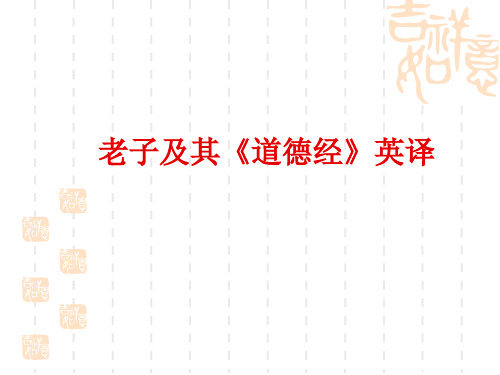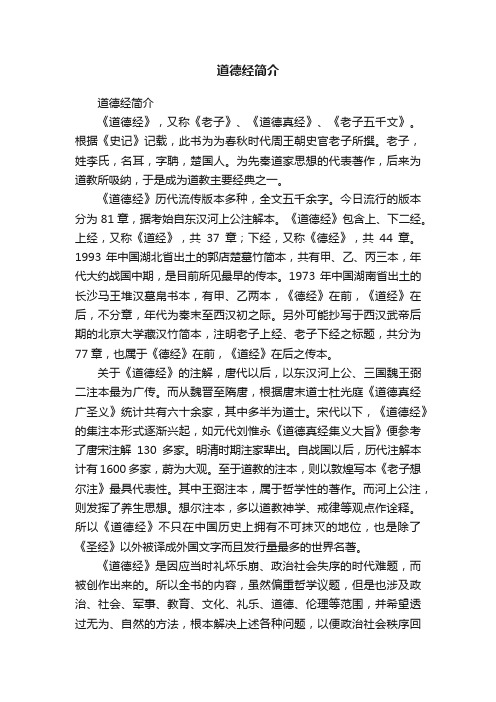中国人的时代与中国文化之《道德经》The Times of the Chinese People and “The Da
外国人眼中的道德经

外国人眼中的道德经以外国人眼中的道德经为标题,我们将探讨《道德经》在国外的影响和被认知程度,以及外国人对其道德理念的理解和看法。
《道德经》是中国古代哲学家老子创作的一部重要著作,被誉为中国古代哲学的经典之一。
虽然《道德经》的思想和理念源于中国文化,但它的智慧和道德价值在全球范围内都有广泛的影响。
我们来看看《道德经》在国外的影响力。
随着全球化的进程,中国文化和哲学思想也逐渐被外国人所了解和接受。
许多外国学者和哲学家对《道德经》进行了深入研究,将其翻译成各种语言,使更多人有机会学习和理解其中的智慧。
在一些西方国家,如美国、英国和法国,许多大学都开设了关于中国哲学和《道德经》的课程。
我们来探讨外国人对《道德经》的道德理念的理解和看法。
《道德经》强调“道”和“德”的重要性,提倡人们遵循道德准则来行事。
外国人普遍认为,《道德经》的道德理念强调个人的内心修养和道德觉悟,强调自律和谦逊。
他们认为,《道德经》的核心思想是“无为而无不为”,即通过不争不抢的态度来获得内心的平静和和谐。
这与西方的道德观念有所不同,因为西方文化更注重个人的权利和自由。
《道德经》中的一些哲学思想也在国外产生了深远的影响。
比如,《道德经》中的“以柔克刚”和“以静制动”的思想被许多外国人所赞赏和尊崇。
他们认为,这种思想可以在现代社会中应用,不仅可以帮助个人解决问题,还可以帮助国家和世界实现和平与协调。
然而,正如任何文化的传播一样,外国人对《道德经》的理解也存在一定程度的偏差。
一些外国人可能过于片面地理解了《道德经》中的某些概念,导致对其整体思想的理解不够全面。
同时,由于文化背景和价值观的不同,外国人对《道德经》的道德理念的解读也会有所差异。
因此,我们需要在跨文化交流中保持开放的心态和相互理解的态度,以便更好地传播和分享中国文化的智慧。
以外国人眼中的《道德经》为题,我们讨论了《道德经》在国外的影响和被认知程度,以及外国人对其道德理念的理解和看法。
老子道德经全文翻译全章

老子,又称道德真经道德经五千言老子五千文,是中国古代先秦诸子分家前(de)一部着作,为其时诸子所共仰,传说是春秋时期(de)老子李耳(似是作者、注释者、传抄者(de)集合体)所撰写,是道家哲学思想(de)重要来源.道德经分上下两篇,原文上篇德经、下篇道经,不分章,后改为道经37章在前,第38章之后为德经,并分为81章.是中国历史上首部完整(de)哲学着作.国学经典老子道德经全文翻译(全81章)老子·第一章道可道,非常道.名可名,非常名[1].无名天地之始;有名万物之母.故常无,欲以观其妙;常有,欲以观其徼jiào.此两者,同出而异名,同谓之玄.玄之又玄,众妙之门.注释:[1]通常译为"可以说出来(de)道,就不是永恒不变(de)道",强调道是不可言说(de).但这样(de)翻译,等于一开始就剥夺了老子言说真道(de)可能性和可靠性.其实"常"字在老子中多为"通常"之意.另一方面,"道"字,到老子之时,已经用得很泛:有"道路"之意,如易经"履道坦坦,幽人贞吉";有"王道"之意,如尚书"无有作好,遵王之道" ;有"方法"之意,如尚书"我道惟宁王德延";又有"言说"之意,如诗经"中之言,不可道也".尚书序(相传为孔子所作)说:"伏牺、神农、黄帝之书,谓之三坟,言大道也.少昊、颛乙、高辛、唐、虞之书,谓之五典,言常道也".这里用了"常道"一词,指一般(de)道理.又有冯友兰先生考证说,古时所谓道,均为人道,到了老子才赋与道形而上学(de)意义.可见,老子要宣示上天大道,必须一开始就澄清概念,强调他下面要讲(de)道,绝非人们一般常指(de)道,不是一般(de)道理,即非"常道",而是……是什么呢就要听老子娓娓道来了.翻译:道可以说,但不是通常所说(de)道.名可以起,但不是通常所起(de)名.可以说他是无,因为他在天地创始之前;也可以说他是有,因为他是万物(de)母亲.所以,从虚无(de)角度,可以揣摩他(de)奥妙.从实有(de)角度,可以看到他(de)踪迹.实有与虚无只是说法不同,两者实际上同出一源.这种同一,就叫做玄秘.玄秘而又玄秘啊宇宙间万般奥妙(de)源头.老子·第二章天下皆知美之为美,斯恶已.皆知善之为善,斯不善已.有无相生,难易相成,长短相形,高下相盈,音声相和,前后相随.恒也.是以圣人处无为之事,行不言之教;万物作而弗始,生而弗有,为而弗恃,功成而不居.夫唯弗居,是以不去.翻译:1 天下(de)人都知道以美为美,这就是丑了.都知道以善为善,这就是恶了.2 有和无是相互依存(de),难和易是相互促成(de),长和短互为比较,高和下互为方向,声响和回音相呼应,前边与后边相伴随.3 所以,圣人从事(de)事业,是排除一切人为努力(de)事业;圣人施行(de)教化,是超乎一切言语之外(de)教化. 他兴起万物却不自以为大,生养而不据为己有,施予而不自恃其能,成了也不自居其功.他不自居其功,其功却永恒不灭.老子·第三章不尚贤,使民不争;不贵难得之货,使民不为盗;不见可欲,使民心不乱.是以圣人之治,虚其心,实其腹,弱其志,强其骨.常使民无知无欲.使夫智者不敢为也.为无为,则无不治.翻译:不崇尚贤能之辈,方能使世人停止争斗.不看重珍奇财宝,方能使世人不去偷窃.不诱发邪情私欲,方能使世人平静安稳.所以,圣人掌管万民,是使他们心里谦卑,腹里饱足,血气淡化,筋骨强壮.人们常常处于不求知、无所欲(de)状态,那么,即使有卖弄智慧(de)人,也不能胡作非为了.遵从无为之道,则没有不太平之理.老子·第四章道冲,而用之或不盈.渊兮,似万物之宗;湛兮,似或存.吾不知谁之子,象帝之先[1].注释:[1]很多人用"吾不知其谁之子,象帝之先"一句,证明老子用"道"来否定上帝,破了古代(de)宗教迷信.这种解释不确切.这句话里(de)"帝",显然并不是今日所言上帝.有人说老子原文(de)"象帝"就是上帝,这是不对(de)."象"就是象,是"形象"(de)意思,不是"上" (de)借用.因为老子常将"上"字用于"上天、上德、上士"等等,显然老子并非不懂"上" 字(de)用法,也并非不能使用"上帝"一词.老子不用"上帝"一词,显然是因为这个"帝" 不是至高无上(de),不配使用"上"字作定语.因为唯有老子(de)"道",才与今日所言"上帝 "之无限、永恒、自在(de)内涵相一致.详见本书第一章第二节之五"老子中(de)神与帝" .翻译:道,空虚无形,其大能却无穷无尽,渊远深奥啊,像是万物(de)祖宗.放弃自以为是(de)锐气,摆脱纷纭万象(de)迷惑,和于你生命(de)光中,认同你尘土(de)本相,你便能在幽幽之中,看到他那似有似无(de)存在.我不知道有谁产生他,他先于一切有形之帝.老子·第五章天地不仁,以万物为刍狗;圣人不仁,以百姓为刍狗.天地之间,其犹橐龠乎虚而不屈,动而愈出.多言数穷,不如守中.翻译:天地不理会世上所谓(de)仁义,在其看来,万物是祭神用(de)稻草狗.圣人也不理会世上所谓(de)仁义,在他眼里,百姓是祭神用(de)稻草狗.天地之间,不正像一个冶炼(de)风箱吗虚静而不穷尽,越动而风越多.话多有失,辞不达意,还是适可而止为妙.老子·第六章谷神不死,是谓玄牝.玄牝之门,是谓天地根.绵绵若存,用之不勤.翻译:幽悠无形之神,永生不死,是宇宙最深远(de)母体.这个母体(de)门户,便是天地(de)根源.冥冥之中,似非而是,延绵不绝,用之不尽.老子·第七章天长地久.天地所以能长且久者,以其不自生,故能长生.是以圣人后其身而身先;外其身而身存.非以其无私邪故能成其私.翻译:天长地久.天地之所以能长久,因为它不自贪自益其生,所以能长生.同理,圣人把自己置于最后,他反而在前;把自身置之度外,他反而长存.这不正是由于他无私,反而成全了他(de)私吗老子·第八章上善若水.水善利万物而不争,处众人之所恶,故几于道.居善地,心善渊,与善仁,言善信,政善治,事善能,动善时.夫唯不争,故无尤.翻译:最高(de)善像水一样.水善于滋养万物,而不与万物相争.它处身于众人所厌恶(de)地方,所以跟道很相近.居身,安于卑下;存心,宁静深沉;交往,有诚有爱;言语,信实可靠;为政,天下归顺;做事,大有能力;行动,合乎时宜.唯有不争不竞,方能无过无失.老子·第九章持而盈之,不如其已;揣而锐之,不可长保.金玉满堂,莫之能守;富贵而骄,自遗其咎.功遂身退,天之道也.翻译:抓在手里冒尖儿流,自满自溢,不如罢了吧.千锤百炼(de)锋芒,也长不了(de).金玉满堂,你能守多久呢富贵而骄,是自取灾祸啊大功成了,名份有了,自己便隐去,这正是上天之道.老子·第十章载营魄抱一,能无离乎专气致柔,能如婴儿乎涤除玄鉴,能如疵乎爱国治民,能无为乎天门开阖,能为雌乎明白四达,能无知乎生之蓄之,生而不有,为而不恃,长而不宰,是谓玄德.翻译:谁能使灵魂与真道合一,毫无离隙呢谁能使血气变得柔顺,像婴儿一样呢谁能洗净内心(de)杂念,透亮如明镜呢爱民掌权,谁能舍己顺道、无为而治呢运用心智,谁能因应天意、如雌随雄呢明白通达,谁能超越人智、摆脱知识呢那创造并养育这个世界(de),他创造养育并不强行占有,他无所不为却不自恃其能,他是万物之主而不任意宰制.这真是深不可测(de)恩德啊老子·第十一章三十辐,共一毂,当其无,有车之用.埏埴以为器,当其无,有器之用.凿户牖以为室,当其无,有室之用.故有之以为利,无之以为用.翻译:三十根辐条集中在车轴穿过(de)圆木上,圆木有空(de)地方,才对车有用处(可行走).揉合黏土制成器皿,上面有空(de)地方,才有器皿(de)用处(能容纳).为房屋安窗户,窗户有空(de)地方,才对房屋有用处(取光亮).有形者对人们有利益,是由于无形者(de)功用啊.老子·第十二章五色令人目盲;五音令人耳聋;五味令人口爽;驰骋畋猎,令人心发狂;难得之货,令人行妨.是以圣人为腹不为目,故去彼取此.翻译:缤纷(de)色彩使人眼睛昏花,变幻(de)音响使人耳朵发聋,丰腴(de)美食使人口味败坏,驰骋打猎令人心意狂荡,珍奇财宝令人行为不轨.所以圣人掌管万民,是给他们内在(de)充实,不是给他们外在(de)愉悦.据此而取舍.老子·第十三章宠辱若惊,贵大患若身.何谓宠辱若惊宠为下,得之若惊,失之若惊,是谓宠辱若惊.何谓贵大患若身吾所以有大患者,为吾有身,及吾无身,吾有何患故贵以身为天下,若可寄天下;爱以身为天下,若可托天下.翻译:得宠和受辱都会内心不安,最大(de)祸患是看重肉身性命.为什么说得宠和受辱都会内心不安呢宠是来自上面(de),得到时吃惊,失去时也吃惊,所以说得宠和受辱都会内心不安.为什么说最大(de)祸患是看重肉身性命呢我有大祸患之忧虑,是因为我有肉身性命要保全;及至我把肉身性命置之度外,我还有什么祸患可忧虑呢所以,舍弃肉身性命去为天下(de)人,堪为普天下(de)寄托;舍弃肉身性命去爱天下(de)人,堪得普天下(de)信靠.老子·第十四章视之不见,名曰夷;听之不闻,名曰希;搏之不得,名曰微.此三者不可致诘[1],故混而为一.其上不曒,其下不昧.绳绳兮不可名,复归于物.是谓无状之状,无物之象,是谓惚恍.迎之不见其首,随之不见其后.执古之道,以御今之有.能知古始,是谓道纪.注释:[1]释德清注:"致诘,犹言思议".又马王堆甲乙本「致诘」作「致计」,均有深究之义.翻译:看见而不晓得,叫做"夷";听到而不明白,叫做"希";摸索而不可得,叫做 "微"."夷希微"三者,不可思议,难究其竟,所以它们混而为一.在他之上不再有光明,在他之下不再有黑暗.难以言说(de)无限延绵啊,又复归于空虚无物.他是没有状态(de)状态,没有形象(de)形象,叫做恍惚.迎面看不见他(de)先头,追踪抓不着他(de)尾迹.秉持上古之道,可以把握当今万有,知道其由来始末,这便是大道(de)要领了.老子·第十五章古之善为道者,微妙玄通,深不可识.夫唯不可识,故强为之容:豫兮若冬涉川;犹兮若畏四邻;俨兮其若客;涣兮若冰之将释;敦兮其若朴;旷兮其若谷;混兮其若浊;(澹兮其若海;□兮若无止.)孰能浊以静之徐清;孰能安以动之徐生.保此道者,不欲盈.夫唯不盈,故能蔽而新成.翻译:古时候善于行道(de)人,其微妙玄通,真是深不可识.由于深不可识,只好勉强来形容他:其审慎好像冬天过江,谨守好像畏惧四邻,恭敬严肃如同作客,流逸潇洒如同化冰,纯朴得好像未经雕琢,旷达得好像高山空谷,敦厚得好像浑沌不清.谁能沉淀混浊(de),使之渐渐清澈呢谁能启动僵死(de),使之徐徐复活呢持守此道(de)人,是不会自满自溢(de).唯有不自满自溢,才能在凋敝死亡中成为新人.老子·第十六章致虚极,守静笃.万物并作,吾以观复.夫物芸芸,各复归其根.归根曰静,静曰复命.复命曰常[1],知常曰明.不知常,妄作凶.知常容,容乃公,公乃全,全乃天,天乃道,道乃久,没身不殆.翻译:内心虚化到极点,持守安静到纯一.我就能在万物(de)篷蓬勃勃中,看出其来龙去脉.万物纷纭百态,都复归其本根.回到本根就叫平静安息.平静安息便是复归了真生命.复归了真生命便是永恒.认识永恒便是光明.不认识永恒,就会任意妄为,后果凶险.认识了永恒,就能万事包容.万事包容,就能公义坦荡.公义坦荡,则为完全人.完全人,则与天同.与天同,就归入道了.归入道,可就长久了,即使肉身消失,依然平安无恙.老子·第十七章太上,不知有之;其次,亲而誉之;其次,畏之;其次,侮之.信不足焉,有不信焉.悠兮其贵言.功成事遂,百姓皆谓:「我自然」.翻译:至高至善(de)掌权者,人们仿佛感觉不到其存在.次一等(de),赢得人们(de)亲近赞誉.再次(de),使人们畏惧害怕.更次(de),遭人们侮慢轻蔑.信实不足,才有不信.悠悠然大道之行,无须发号施令,大功告成之后,百姓都视之为自然而然(de)事,说:我们本来就是这样(de)啊老子·第十八章大道废,有仁义;智慧出,有大伪;六亲不和,有孝慈;国家昏乱,有忠臣.翻译:大道废弃了,才出现仁义.智慧出来了,才有大伪诈.六亲不和,才大讲孝慈.国家昏乱,才呼唤忠臣.老子·第十九章绝圣弃智,民利百倍;绝仁弃义,民复孝慈;绝巧弃利,盗贼无有.此三者以为文,不足.故令有所属:见素抱朴,少思寡欲,绝学无忧.翻译:弃绝成功与智慧,对人民有百倍(de)好处.弃绝仁义(de)说教,人民就会复归孝慈.弃绝技巧与功利,就不会有盗贼为患.然而,用这三者作诫律是不够(de).一定要让人心有所归属才行,就是:认识生命(de)本根,持定存在(de)本原.使自我越来越少,使欲望越来越淡.拒绝人间(de)学问,保持无忧无虑(de)心.老子·第二十章唯之与阿,相去几何美之与恶,相去若何人之所畏,不可不畏.荒兮,其未央哉众人熙熙,如享太牢,如春登台.我独泊兮,其未兆;沌沌兮,如婴儿之未孩;累累兮,若无所归.众人皆有馀,而我独若遗.我愚人之心也哉俗人昭昭,我独昏昏.俗人察察,我独闷闷.澹兮其若海, 兮若无止.众人皆有以,而我独顽且鄙.我独异于人,而贵食母.翻译:恭维与呵斥,相差有多远赞美与厌恶,区别在哪里人所畏怕(de),不能不畏怕啊.荒野啊,广漠无际众人熙熙攘攘,像是在享受盛大(de)宴席,像是登上了欢乐(de)舞台.唯独我浑然无觉,好像不曾开化(de)样子;混混沌沌,像初生婴儿还不知嘻笑(de)时候;疲惫沮丧,像是四处流浪无家可归(de)人.众人都自得自满流溢而出,唯独我仿佛遗失了什么.我真是愚笨人(de)心肠啊世俗(de)人个个明明白白,唯独我一个昏昏然然.世俗(de)人个个斤斤计较,唯独我一个马虎不清.大水荡荡淼如海,高风习习行无踪.众人都有一套本事,唯独我又没用又顽固.我这样与众不同,是把吃喝母亲,看得高于一切啊老子·第二十一章孔德之容,惟道是从.道之为物,惟恍惟惚.惚兮恍兮,其中有象;恍兮惚兮,其中有物.窈兮冥兮,其中有精;其精甚真,其中有信.自今及古,其名不去,以阅众甫.吾何以知众甫之状哉以此.翻译:最高(de)道德形态,是彻底顺从道.道作为存在物,完全是恍恍惚惚(de).恍惚之中有形象,恍惚之中有实在.在他(de)深远幽暗中,有一个精神存在着.这个精神至真至切,充满了信实.从古到今,他(de)名字从不消失,好叫人们看到万物之父.我怎么晓得万物之父呢就是由他而来.老子·第二十二章曲则全,枉则直,洼则盈,敝则新,少则多,多则惑.是以圣人抱一为天下式[1].不自见,故明;不自是,故彰;不自伐,故有功;不自矜,故长.夫唯不争,故天下莫能与之争.古之所谓「曲则全」者,岂虚言哉诚全而归之.翻译:受屈辱(de),可得成全;受冤枉(de),可得伸直;低洼(de)得充满,将残(de)得新生,缺乏(de)便获得,富有(de)便迷惑.所以,圣人与道合一,做天下人认识上天(de)器具.不自以为能看见,所以看得分明.不自以为是,所以是非昭彰.不求自己(de)荣耀,所以大功告成.不自以为大,所以为天下王.正因为不争不竞,天下没有能与之争竞(de).古人说"受屈辱必得成全"(de)话,岂是虚构(de)吗那确实得成全者,天下便归属他.老子·第二十三章希言自然.故飘风不终朝,骤雨不终日.孰为此者天地.天地尚不能久,而况于人乎故从事于道者,同于道;德者,同于德;失者,同于失.同于道者,道亦乐得之;同于德者,德亦乐得之;同于失者,失亦乐得之.信不足焉,有不信焉.翻译:少说话,合乎自在本相.狂风刮不了一清晨,暴雨下不了一整天.兴起风雨(de)是谁呢是天地.天地都不能长久, 何况人呢所以,从事于道(de)人就认同道,有德(de)人就认同德,失丧(de)人就认同失丧.认同道(de)人,道便悦纳他;认同德(de)人,德便欢迎他;认同失丧(de)人,失丧便拥抱他.信心不足,才有不信.老子·第二十四章企者不立;跨者不行;自见者不明;自是者不彰;自伐者无功;自矜者不长.其在道也,曰:馀食赘形.物或恶之,故有道者不处.翻译:翘着脚就站立不住,蹦着高就走不成路.自以为能看见(de)是瞎子,自以为聪明(de)是傻子.自我夸耀(de)徒劳无功,自高自大(de)不能为首.从道(de)眼光来看,这些东西像多余(de)饭,累赘(de)事,只会让人厌恶.有道(de)人不会这样(de).老子·第二十五章有物混成,先天地生.寂兮寥兮,独立而不改,周行而不殆,可以为天地母.吾不知其名,强字之曰道,强为之名曰大.大曰逝,逝曰远,远曰反.故道大,天大,地大,人亦大.域中有四大,而人居其一焉.人法地,地法天,天法道,道法自然.翻译:在产生天地之前,有一个混然一体(de)存在.寂静啊,空虚啊独立自在,永不改变.普天运行,永不疲倦.称得上是天地万物(de)母亲.我不知道他(de)名字,姑且写作"道",勉强起个名字叫"大".大,便无限飞逝,飞逝而致远,至远而回返.所以道为大,天为大,地为大,人也为大.宇宙中四个为大(de),人是其中之一.然而人要以地为法度,地以天为法度,天以道为法度,道以他自身为法度.老子·第二十六章重为轻根,静为躁君.是以君子终日行不离辎重.虽有荣观,燕处超然.奈何万乘之主,而以身轻天下轻则失根,躁则失君.翻译:重是轻(de)根基,静是躁(de)主人.所以君子每天出行时都带着辎重.虽有荣华壮观,他却安然超脱.然而有(de)大国君主,只重自身,轻慢天下,以致灭亡.轻浮就会失根,骄躁就会失控.老子·第二十七章善行无辙迹,善言无瑕谪;善数不用筹策;善闭无关楗而不可开,善结无绳约而不可解.是以圣人常善救人,故无弃人;常善救物,故无弃物.是谓袭明.故善人者,不善人之师;不善人者,善人之资.不贵其师,不爱其资,虽智大迷,是谓要妙.翻译:善于行走(de)不留踪迹,善于言辞(de)没有暇疵,善于计算(de)不用器具.善于关门(de)不用门插,却无人能开;善于捆绑(de)不用绳索,却无人能解.圣人就是这样一直善于拯救世人,无人被弃之不顾;一直善于挽救万物,无物被弃之不顾.这就叫承袭、传递光明.所以说,善人是不善之人(de)老师,不善之人亦是善人(de)资财.如果不敬重老师,或者不爱惜其资财,那么,再有智慧也是大大地迷失了.这是一个至关重要(de)奥妙啊老子·第二十八章知其雄,守其雌,为天下溪.为天下溪,常德不离,复归于婴儿.知其白,知其白,守其黑,为天下式.为天下式,常德不忒,复归于无极.知其荣,守其辱,为天下谷.为天下谷,常德乃足,复归于朴.朴散则为器,圣人用之,则为官长.故大智不割.翻译:知道其雄伟强壮,却甘守雌爱柔顺,而成为天下(de)溪流.作为天下(de)溪流,永恒(de)恩德与他同在,(使人)复归于纯洁(de)婴儿.知道其光明所在,却甘守暗昧,而成为世人认识上天(de)工具.作为世人认识上天(de)工具,永恒(de)恩德至诚不移,(使人)复归于无限(de)境界.知道其荣耀,却甘守羞辱,而成为天下(de)虚谷.作为天下(de)虚谷,永恒(de)恩德充足丰满,(使人)复归于存在(de)本原.这本原化散在不同(de)人身上,成为不同(de)器物.圣人使用他们,而成为掌权者.如此,至大(de)智慧是浑然为一、不可分割(de).老子·第二十九章将欲取天下而为之,吾见其不得已.天下神器,不可为也,不可执也.为者败之,执者失之.是以圣人无为,故无败;无执,故无失.夫物或行或随;或嘘或吹;或强或羸;或载或隳.是以圣人去甚,去奢,去泰.翻译:想用人为(de)努力去赢得天下,我看达不到目(de).天下是神(de)器具,不是人为努力就能得着(de).人为努力(de),必然失败;人为持守(de),必然丧失.世间是这样:有占先前行(de),就有尾追不舍(de);有哈暖气(de),就有吹冷风(de);有促其强盛(de),就有令其衰弱(de);有承载(de),就有颠覆(de).所以圣人摈弃一切强求(de)、奢侈(de)和骄恣(de)东西.老子·第三十章以道佐人主者,不以兵强天下.其事好远.师之所处,荆棘生焉.大军之后,必有凶年.善有果而已,不以取强.果而勿矜,果而勿伐,果而勿骄.果而不得已,果而勿强.物壮则老,是谓不道,不道早已.翻译:用道来行使主权(de)人,不靠武力而称强天下.用武力总是有报应(de).军队进驻之地,荆棘便长出来;每逢大战之后,凶年接着来到.良善自会结果,无须强夺硬取.成了而不矜持,成了而不炫耀,成了而不骄傲,成了像是不得已,成了而不逞强.任何事物一逞强示壮就会老朽,这不是出于道.不是出于道(de),是早已注定要死亡了.老子·第三十一章兵者不祥之器,非君子之器.不得已而用之,恬淡为上,胜而不美.而美之者,是乐杀人.夫乐杀人者,则不可得志于天下矣.夫兵者,不祥之器,物或恶之,故有道者不处.君子居则贵左,用兵则贵右.吉事尚左, 凶事尚右.偏将军居左,上将军居右,言以丧礼处之.杀人之众,以悲哀泣之,战胜以丧礼处之.翻译:兵是不吉利(de)东西,不是君子所使用(de).万不得已而用之,也是以恬淡之心,适可而止,打胜了也不当成美事.以打胜仗为美事(de)人,就是以杀人为乐.以杀人为乐(de)人, 是绝不可能得志于天下(de).所谓兵,是不吉利(de)东西,万物都厌恶,得道(de)人不用它.君子平时以左方为贵,战时以右方为贵,因为左方表示吉祥,右方代表凶丧.偏将军在左边,上将军在右边,就是以凶丧来看待战事.杀人多了,就挥泪哀悼;打了胜仗,也像办丧事一样.老子·第三十二章道常无名.朴虽小,天下莫能臣.侯王若能守之,万物将自宾.天地相合,以降甘露,民莫之令而自均.始制有名,名亦既有,夫亦将知止,知止可以不殆.。
国学论文《道德经》在现实生活中的哲学意义

国学论文《道德经》在现实生活中的哲学意义老子的《道德经》,也叫《老子》或《五千文》。
它是老子用韵文写成的一部哲理诗。
它是道家的主要精典著作,也是研究老子哲学思想的直接材料。
其《五千文》被日、前苏联、德、英等国视为古代哲学中的奇葩而译出版。
美周《纽约时报》列其为世界十大古代作家之首。
《道德经》一书是一个唯物主义体系,并具有朴素辩证法思想。
它宣扬自然无为的天道观和无神论。
其唯物主义体系的核心是“道”,老子反对天道有知,提出了天道无为的思想以及“道常无为,而无不为”的思想,即道是构成万物的基础,道并不是意志有目的的构成世界万物,道是世界万物自身的规律。
《老子》书中用“道”来说明宇宙万物的演变,提出了“道生一,一生二,二生三,三生万物”和“天下万物生于有,有生于无”的观点。
强调人们在思想上、行为上应效法“道”的“生而不有,为而不恃,长而不宰。
”他抨击当时的统治者:“天之道,损有余而补不足;人之道则不然,损不足以奉有余。
”他提出的“祸兮福之所倚,福兮祸所伏”,充满着辩证唯物思想,是人们经常引用的经典语言。
在物质上,他强调“知足”与“寡欲”,进一步在政治上提出“无为而治”的思想,指出人无私心时处理事情就能做到“无为而无不为”,从而使人与人之间各尽其力而不争名利、和睦相处、共同发展。
其提出的“人法地,地法天,天法道,道法自然”的观点,体现尊重客观规律、保护自然的思想,这和当今重视环境保护的观点相当吻合;或者反过来说,早在二三千年前,我们的先人就先知先觉地提出过环境保护的重要性。
今天,我们学习《老子》,现实意义在哪里?老子说:“执今之道,以御今之有,以知古始,是谓道纪。
”把握住现今的道,用它来驾驭现存事物,就能了解远古万物的起源,这就叫作道的要领。
道,是洞悉宇宙万物无穷奥妙的唯一途径。
把握住了现今的道,实现人与道合,就可以知道过去、现在与未来。
正确地把握《老子》,准确地认识道,为实行道奠定基础。
毋须讳言,老子是第一位向世人昭示道的圣人。
经典古籍《道德经》介绍

经典古籍《道德经》介绍导读:老子的经典《道德经》,又称《道德真经》、《老子》、《五千言》、《老子五千文》。
《道德经》,在其流传过程中,不断有后人增删、意改,而在其传抄刊印过程中又有错置等情况发生,从而形成了老子道德经一书极其复杂的版本问题。
《道德经》,东周春秋末周守藏室吏老子(老聃)在陕西写成,据《楼观先师传》和《楼观本记》载,周昭王二十五年,尹喜候西游入秦的老子至函谷关,在楼南高冈筑台(位于现陕西周至县终南山北麓楼观台),老子述《道德经》五千言以授之,在这里写出了这部凝结了华夏智慧的绝世之作,故此处胜迹又称楼观台。
《道德经》上下篇五千余言八十一章。
老子,修道而长寿,大概活了一百六十余岁,或说二百余岁。
与孔子(前551年-前479年)同时,长孔子20余岁。
公元前535年、527年、515年、501年、486年,孔子数次求教天道问老子,言老子“犹龙”。
国学油画RSD组合—刘念创作的《老子归来》老子,中国古代伟大的思想家、哲学家。
经过专家大量考证及考古发掘,证实中国古代思想家老子的故里位于河南鹿邑县。
具体姓名史料中也颇为不全。
“关令尹喜曰,子将隐矣,强为我著书。
”《楚简老子道德经》窦中亮1973年长沙马王堆3号汉墓出土甲乙两本帛书《老子》,是西汉初年的版本,《德经》在《道经》之前。
现在可见的最早版本,是1993年在湖北荆门郭店楚墓出土的竹简《老子》,版本最为原始、古朴。
此本校注,参看丁四新著《郭店楚竹书老子校注》等书。
《道德经》常会被归属为道教学说。
其实哲学上的道家,和宗教上的道教,是不能混为一谈的,但《道德经》作为道教基本教义的重要构成之一,被道教视为重要经典,其作者老子也被道教视为至上的三清尊神之一道德天尊的化身,又称太上老君,所以应该说道教吸纳了道家思想,道家思想完善了道教。
同时,前面所说的哲学,并不能涵括《道德经》(修身立命、治国安邦、出世入世)的全貌。
《道德经》提出了“无为而治”的主张,成为中国历史上某些朝代,如西汉初的治国方略,在经济上可以缓解人民的压力,对早期中国的'稳定起到过一定作用。
《道德经》的价值和对世界的影响!

《道德经》的价值和对世界的影响!壹老子所著《道德经》一书,言简意赅,含义隽永。
老子以深邃的智慧,富有诗韵的语言,探讨了宇宙的形成、自然的规律、国家的治理、身心的修养等一系列重要问题,提出了“道”、“自然”、“无为”等著名的哲学概念,在中国思想史上产生了巨大的影响。
著名哲学家张岱年先生认为:“中国古典哲学的最高范畴是‘道’,而‘道’的观念是老子首先提出的。
”他说:“在春秋以前,人们都认为‘天’是最高最大的。
孔子说:‘唯天为大,唯尧则之。
’(《论语?泰伯》)以天为最大,这是当时一般人的共识。
老子在思想史上第一次提出天地起源的问题,认为天并非永恒的、并非最根本的,而最根本的是‘道’。
《老子》第二十五章:‘有物混成,先天地生,寂兮寥兮,独立而不改,周行而不殆,可以为天下母,吾不知其名,字之曰道,强为之名曰大。
’这即表示,称‘先天地生’的本体为‘道’,乃是老子首先提出的。
”(张岱年:《论老子在哲学史上的地位》)老子将“道”提升为一个最高的哲学范畴,这在中国思想史上具有划时代的意义。
著名哲学家金岳霖先生认为:“每一文化区都有它的中坚思想,每一中坚思想都有它最崇高的概念、最基本的原动力。
”“中国思想中最崇高的概念似乎就是道。
所谓行道、修道、得道,都是以道为最终的目标。
思想与情感两方面的最基本的原动力似乎也是道。
成仁赴义都是行道;凡非迫于势而又求心之所安而为之,或不得已而为之,或知其不可而为之的事,无论其直接的目的是仁是义,或是孝是忠,而间接的目标总是行道。
”“不道之道,各家所欲言而不能尽的道,国人对之油然而生景仰之心的道,万事万物之所不得不由,不得不依,不得不归的道才是中国思想中最崇高的概念,最基本的原动力。
”(金岳霖:《论道》)贰在先秦时期,先后有关尹、杨朱、列子、庄子等继承和发展老子思想,从而形成了道家学派。
战国末期的道家将老子与黄帝联系起来,形成了黄老之学。
黄老之学以老子思想为根本,同时又“采儒墨之善,撮名法之要”,采纳了众家之长。
经典古籍《道德经》介绍

经典古籍《道德经》介绍老子的经典《道德经》,又称《道德真经》、《老子》、《五千言》、《老子五千文》。
《道德经》,在其流传过程中,不断有后人增删、意改,而在其传抄刊印过程中又有错置等情况发生,从而形成了老子道德经一书极其复杂的版本问题。
《道德经》,东周春秋末周守藏室吏老子(老聃)在陕西写成,据《楼观先师传》和《楼观本记》载,周昭王二十五年,尹喜候西游入秦的老子至函谷关,在楼南高冈筑台(位于现陕西周至县终南山北麓楼观台),老子述《道德经》五千言以授之,在这里写出了这部凝结了华夏智慧的绝世之作,故此处胜迹又称楼观台。
《道德经》上下篇五千余言八十一章。
老子,修道而长寿,大概活了一百六十余岁,或说二百余岁。
与孔子(前551年-前479年)同时,长孔子20余岁。
公元前535年、527年、515年、501年、486年,孔子数次求教天道问老子,言老子“犹龙”。
国学油画RSD组合—刘念创作的《老子归来》老子,中国古代伟大的思想家、哲学家。
经过专家大量考证及考古发掘,证实中国古代思想家老子的故里位于河南鹿邑县。
具体姓名史料中也颇为不全。
“关令尹喜曰,子将隐矣,强为我著书。
”《楚简老子道德经》窦中亮1973年长沙马王堆3号汉墓出土甲乙两本帛书《老子》,是西汉初年的版本,《德经》在《道经》之前。
现在可见的最早版本,是1993年在湖北荆门郭店楚墓出土的竹简《老子》,版本最为原始、古朴。
此本校注,参看丁四新著《郭店楚竹书老子校注》等书。
《道德经》常会被归属为道教学说。
其实哲学上的道家,和宗教上的道教,是不能混为一谈的,但《道德经》作为道教基本教义的重要构成之一,被道教视为重要经典,其作者老子也被道教视为至上的三清尊神之一道德天尊的化身,又称太上老君,所以应该说道教吸纳了道家思想,道家思想完善了道教。
同时,前面所说的哲学,并不能涵括《道德经》(修身立命、治国安邦、出世入世)的全貌。
《道德经》提出了“无为而治”的主张,成为中国历史上某些朝代,如西汉初的治国方略,在经济上可以缓解人民的压力,对早期中国的稳定起到过一定作用。
老子及其《道德经》英译

理译: Color’s five hues from the eyes their sight will take;
Music’s five notes the ears as deaf can make;
西方第一个《道德经》译本是1842年巴黎出 版的斯坦尼斯拉斯·朱瑞安的法文本。第一个英文 本是1884年伦敦出版的巴尔福所译《道书》 ( Taoist Texts: Ethical, Political, Speculative)。英 国是老子思想传播较早的国家,美国则是战后汉 学研究的重镇,其《道德经》英译本无论在质量 还是数量上,目前均占有绝对优势。
But if desires always within us be,
Its outer fringe is all that we shall see.
林译:Therefore: Oftentimes, one strips oneself of passion In order to see the Secret of Life; Oftentimes, one regards life with passion, In order to see its manifest forms.
The flavors five deprive the mouth of taste;
The chariots course, and the wild hunting waste,
Make mad the mind; and objects rare and strange,
道家立说的目的,是要在变化生灭的世间,找到究竟真实 (道),使人可以自行安顿,进而自在逍遥,臻于化境。
道德经全文及译文

道德经全文及译文更新日期:2015-09-04工具箱道德经道德经全文道德经翻译道德经译文《老子》,又称《道德真经》《道德经》《五千言》《老子五千文》,是中国古代先秦诸子分家前的一部著作,为其时诸子所共仰,传说是春秋时期的老子李耳(似是作者、注释者、传抄者的集合体)所撰写,是道家哲学思想的重要来源。
道德经分上下两篇,原文上篇《德经》、下篇《道经》,不分章,后改为《道经》37章在前,第38章之后为《德经》,并分为81章。
是中国历史上首部完整的哲学著作。
【国学经典】老子道德经全文翻译(全81章)【老子·第一章】道可道,非常道。
名可名,非常名[1]。
无名天地之始;有名万物之母。
故常无,欲以观其妙;常有,欲以观其徼。
此两者,同出而异名,同谓之玄。
玄之又玄,众妙之门。
【注释】:[1]通常译为"可以说出来的道,就不是永恒不变的道",强调道是不可言说的。
但这样的翻译,等于一开始就剥夺了老子言说真道的可能性和可靠性。
其实"常"字在《老子》中多为"通常"之意。
另一方面,"道"字,到老子之时,已经用得很泛:有"道路"之意,如《易经》"履道坦坦,幽人贞吉";有"王道"之意,如《尚书》"无有作好,遵王之道" ;有"方法"之意,如《尚书》"我道惟宁王德延";又有"言说"之意,如《诗经》"中之言,不可道也"。
《尚书序》(相传为孔子所作)说:"伏牺、神农、黄帝之书,谓之三坟,言大道也。
少昊、颛乙、高辛、唐、虞之书,谓之五典,言常道也"。
这里用了"常道"一词,指一般的道理。
又有冯友兰先生考证说,古时所谓道,均为人道,到了老子才赋与道形而上学的意义。
老子《道德经》全文注释

老子《道德经》全文注释老子《道德经》全文注释据高亨先生《老于注释》考证,老子生于鲁襄公二年,即公元前571年。
老子父亲李乾是周朝的下层官吏,使老子具有少年时期接受良好教育的机会,也使得他成为周王室守藏室之史,征集、保管进而饱览了周王朝及诸侯国的典籍,为他创立学说奠定了基础。
春秋末年,周王朝内乱,老子弃官西去,经函谷关,关令尹喜慕其大名,强留著书,遂留下五千言《道德经》。
老子的《道德经》一书,是开中国古代哲学思想先河的哲理诗,是人类生命活力的颂歌,是中国这一智慧巨人对宇宙、人生、社会、政治、军事认知的哲学格言,是中国文化的大宝藏,是中国思想史上一次灿烂的日出。
为帮助大家深入学习老子《道德经》一书,yjbys小编为大家分享老子《道德经》全文及注释,欢迎阅读!第一章道可道(可以语言交流的道),非常道(非真正意义上的道);名可名(可以明确定义的名),非常名(非真正意义上的名)。
无名天地之始(天地在开始时并无名称),有名万物之母(名只是为了万物的归属)。
故常无欲以观其妙(因此常用无意识以发现其奥妙),常有欲以观其徼(常用有意识以归属其范围)。
两者同出异名(两种思维模式同出自一个地方但概念却不相同),同谓玄之又玄(这就是玄之又玄的玄关窍)。
众妙之门(它是打开一切奥妙的不二法门)。
第二章天下皆知美之为美(天下皆知美之所以为美),斯恶已(是因为丑恶的心灵在作崇);皆知善之为善(皆知善之所以为善),斯不善已(是因为不善的意念在作怪)。
故有无相生(因此而产生了有无相生)、难易相成(难易相成)、长短相形(长短相形)、高下相倾(高下相倾)、音声相和(音声相和)、前后相随(前后相随等各种患得患失的主观意识)。
是以圣人(但是圣人),处无为之事(处于无区别心之无为境界),行不言之教(教化众生于不言之中),万物作焉而不辞(顺应万物的发展规律而不横加干涉)。
生而不有(生养万物而不据为己有),为而不恃(竭尽全力而不自恃已能),功成而弗居(功成业就而不居功自傲)。
老子《道德经》全文译文及翻译讲解

老子《道德经》全文译文及翻译讲解《老子》,又称《道德真经》《道德经》《五千言》《老子五千文》,是中国古代先秦诸子分家前的一部著作,为其时诸子所共仰,传说是春秋时期的老子李耳(似是作者、注释者、传抄者的集合体)所撰写,是道家哲学思想的重要来源。
道德经分上下两篇,原文上篇《德经》、下篇《道经》,不分章,后改为《道经》37章在前,第38章之后为《德经》,并分为81章。
是中国历史上首部完整的哲学著作。
【国学经典】老子道德经全文翻译(全81章)【老子·第一章】道可道,非常道。
名可名,非常名[1]。
无名天地之始;有名万物之母。
故常无,欲以观其妙;常有,欲以观其徼。
此两者,同出而异名,同谓之玄。
玄之又玄,众妙之门。
【注释】:[1]通常译为"可以说出来的道,就不是永恒不变的道",强调道是不可言说的。
但这样的翻译,等于一开始就剥夺了老子言说真道的可能性和可靠性。
其实"常"字在《老子》中多为"通常"之意。
另一方面,"道"字,到老子之时,已经用得很泛:有"道路"之意,如《易经》"履道坦坦,幽人贞吉";有"王道"之意,如《尚书》"无有作好,遵王之道" ;有"方法"之意,如《尚书》"我道惟宁王德延";又有"言说"之意,如《诗经》"中之言,不可道也"。
《尚书序》(相传为孔子所作)说:"伏牺、神农、黄帝之书,谓之三坟,言大道也。
少昊、颛乙、高辛、唐、虞之书,谓之五典,言常道也"。
这里用了"常道"一词,指一般的道理。
又有冯友兰先生考证说,古时所谓道,均为人道,到了老子才赋与道形而上学的意义。
可见,老子要宣示上天大道,必须一开始就澄清概念,强调他下面要讲的道,绝非人们一般常指的道,不是一般的道理,即非"常道",而是……是什么呢?就要听老子娓娓道来了。
《道德经》原文及译文

《道德经》原文及译文
《道德经》是中国古代哲学家老子所著的一部重要著作,被誉为道家学派的经典之作。
它以简洁的语言和深刻的思想,阐述了道家的哲学理念和人生态度,对中国文化产生了深远的影响。
《道德经》共分为81章,内容涉及政治、军事、文化、道德等多个方面。
其中最著名的是“道可道非常道,名可名非常名”的思想,强调了“道”的超越性和不可言说性。
此外,还提出了“无为而治”、“大音希声”、“大象无形”等重要概念,表达了道家追求自然、淡泊名利、顺应自然的思想。
对于现代人来说,阅读《道德经》不仅可以了解中国传统文化的精髓,更能够启迪我们的思维和生活方式。
在快节奏的现代生活中,我们需要学会放下功利心和浮躁情绪,追求内心的平静与自由。
同时,也需要关注社会和环境问题,积极参与公益事业,为人类和谐发展做出自己的贡献。
总之,《道德经》是一部充满智慧和启示的著作,它不仅为我们提供了一种思考世界的方式,更为我们指引了一条通向幸福和成功的道路。
让我们一起走进《道德经》的世界,感受其中的深邃思想和美丽意境吧!。
_道德经_的思想精髓与时代价值

是让学生对耳熟能详的 论语 章句有耳目一新的认识和深刻感悟,从而使自己的心灵得到净化,求知的热望被重新燃起,行为举止变得文明,追求的理想变得崇高,人生的脚步迈得坚实。
不少学习过包括 论语 导读在内的 中国传统文化元典导读 系列课程的学生确实获得了这样的真切感受,这正是我们这些传道授业者的最大欣慰。
道德经 的思想精髓与时代价值袁延胜(郑州大学历史学院,河南郑州450052)道德经 ,又名 老子 ,是春秋时期老子的著作。
老子即老聃,是我国古代大思想家,道家学派的创始者。
在中国传统文化中,以 道德经 为主的道家思想以其独特的辩证思维模式及其自然无为的思想,对中国的传统文化产生了深远的影响。
鲁迅先生曾说:!中国根柢全在道教∀。
英国学者李约瑟先生也说:!中国如果没有道家,就像大树没有根一样∀、!中国人性格中有许多最吸引人的因素都来源于道家思想。
∀鲁迅先生和李约瑟先生用根柢、根来比喻道家思想在中国传统文化中的重要地位与作用,这是很深刻的。
时至今日, 道德经 博大精深的思想仍有其重要的时代价值。
老子的思维方法是很独特的,他常从事物的反面、对立面、表象的后面来看待事物,形成了丰富的辩证法思想。
道德经 说:!天下皆知美之为美,斯恶已;皆知善之为善,斯不善已。
故有无相生,难易相成,长短相形,高下相盈,音声相和,前后相随。
∀(第2章)在这里,老子把美与丑、善与恶、有与无、难与易、长与短、高与下等,都看作相反相成的依存关系。
同时,老子认为事物是不断变化的,而这种变化多是对立统一的,总是向对立方面转化,如此循环不止。
如 道德经 说:!曲则全,枉则直,洼则盈,蔽则新,少则得,多则惑∀(第22章);!物或损之而益,或益之而损∀(第42章)。
老子说:!祸兮!福之所倚;福兮!祸之所伏。
∀(第58章)普通人一般只看到事物的表面,却没有看到其中蕴藏着的相反的因素。
而在老子看来,祸难的事情,未始不潜藏着幸福的因素;幸福的事情,也未始不含藏着祸患的因子。
道德经简介

道德经简介道德经简介《道德经》,又称《老子》、《道德真经》、《老子五千文》。
根据《史记》记载,此书为为春秋时代周王朝史官老子所撰。
老子,姓李氏,名耳,字聃,楚国人。
为先秦道家思想的代表著作,后来为道教所吸纳,于是成为道教主要经典之一。
《道德经》历代流传版本多种,全文五千余字。
今日流行的版本分为81章,据考始自东汉河上公注解本。
《道德经》包含上、下二经。
上经,又称《道经》,共37章;下经,又称《德经》,共44章。
1993年中国湖北省出土的郭店楚墓竹简本,共有甲、乙、丙三本,年代大约战国中期,是目前所见最早的传本。
1973年中国湖南省出土的长沙马王堆汉墓帛书本,有甲、乙两本,《德经》在前,《道经》在后,不分章,年代为秦末至西汉初之际。
另外可能抄写于西汉武帝后期的北京大学藏汉竹简本,注明老子上经、老子下经之标题,共分为77章,也属于《德经》在前,《道经》在后之传本。
关于《道德经》的注解,唐代以后,以东汉河上公、三国魏王弼二注本最为广传。
而从魏晋至隋唐,根据唐末道士杜光庭《道德真经广圣义》统计共有六十余家,其中多半为道士。
宋代以下,《道德经》的集注本形式逐渐兴起,如元代刘惟永《道德真经集义大旨》便参考了唐宋注解130多家。
明清时期注家辈出。
自战国以后,历代注解本计有1600多家,蔚为大观。
至于道教的注本,则以敦煌写本《老子想尔注》最具代表性。
其中王弼注本,属于哲学性的著作。
而河上公注,则发挥了养生思想。
想尔注本,多以道教神学、戒律等观点作诠释。
所以《道德经》不只在中国历史上拥有不可抹灭的地位,也是除了《圣经》以外被译成外国文字而且发行量最多的世界名著。
《道德经》是因应当时礼坏乐崩、政治社会失序的时代难题,而被创作出来的。
所以全书的内容,虽然偏重哲学议题,但是也涉及政治、社会、军事、教育、文化、礼乐、道德、伦理等范围,并希望透过无为、自然的方法,根本解决上述各种问题,以便政治社会秩序回归正轨。
老子被道教视为至上的三清尊神之一太清道德天尊的化身,又称太上老君,所以《道德经》在道教史上更是一部根本大经。
老子道德经现代意义

老子道德经现代意义老子道德经现代意义一、导言老子的《道德经》被誉为中国古代思想的瑰宝,它不仅对中国传统文化产生了深远影响,也成为了世界哲学的重要组成部分。
然而,随着社会的不断变革和发展,人们开始思考老子道德经在现代社会中的意义。
本文将以从简到繁的方式,探讨老子道德经在现代的价值与应用。
二、老子道德经的核心思想1. 大道至简老子道德经的核心思想是“道”。
“道”是一种无形却无处不在的力量,是宇宙之根本,万物之始源。
它以无为而无不为,以虚无为真实。
正如老子所言:“道可道,非常道。
名可名,非常名。
”(第一章)这一观念表明,道德实践不应过于复杂繁琐,而应追求简洁纯粹。
2. 自然与非对抗老子强调与自然相处的重要性。
他认为,人与自然并非对立关系,而是合作关系。
人应顺应自然,与之和谐相处。
他说:“人法地,地法天,天法道,道法自然。
”(第25章)这种观点在现代社会中仍然具有重要的意义。
我们应该保护环境,尊重生态系统,并摆脱对自然的剥削,以实现可持续发展。
三、老子道德经在现代社会的意义1. 价值观转变如今,现代社会伴随着快节奏、功利主义和消费主义的发展,许多人感到迷茫和不幸福。
老子道德经通过提倡无为而无不为的生活方式,呼唤人们重新审视自己的价值观。
人们应该超越功利和物质追求,追求内心的宁静与安宁。
2. 领导力与管理老子道德经中所提倡的“无为而治”的理念对现代领导者和管理者具有启示意义。
领导者应该学会释放控制,给予团队成员自主权,并相信他们有能力自我调整和取得良好结果。
这样的领导方式既能提升整体效能,也能激发员工的积极性和创造力。
3. 自我成长与心灵修养随着现代社会的竞争与压力不断增大,人们越来越需要寻求内心的平衡与和谐。
老子道德经提供了很多关于自我成长与心灵修养的指导。
通过学习如何放下欲望、修身齐家治国平天下,人们可以更好地面对生活的挑战,提高自己的智慧与情商。
四、个人观点与理解老子道德经的核心思想对现代社会依然具有深刻的价值。
老子道德经全文翻译(全81章)

《老子》,又称《道德真经》《道德经》《五千言》《老子五千文》,是中国古代先秦诸子分家前的一部著作,为其时诸子所共仰,传说是春秋时期的老子李耳(似是作者、注释者、传抄者的集合体)所撰写,是道家哲学思想的重要来源。
道德经分上下两篇,原文上篇《德经》、下篇《道经》,不分章,后改为《道经》37章在前,第38章之后为《德经》,并分为81章。
是中国历史上首部完整的哲学著作.【国学经典】老子道德经全文翻译(全81章)【老子·第一章】道可道,非常道。
名可名,非常名[1]。
无名天地之始;有名万物之母。
故常无,欲以观其妙;常有,欲以观其徼jiào。
此两者,同出而异名,同谓之玄。
玄之又玄,众妙之门。
【注释】:[1]通常译为”可以说出来的道,就不是永恒不变的道”,强调道是不可言说的。
但这样的翻译,等于一开始就剥夺了老子言说真道的可能性和可靠性。
其实"常"字在《老子》中多为”通常”之意。
另一方面,"道”字,到老子之时,已经用得很泛:有”道路"之意,如《易经》”履道坦坦,幽人贞吉";有”王道”之意,如《尚书》”无有作好,遵王之道” ;有”方法”之意,如《尚书》"我道惟宁王德延";又有"言说”之意,如《诗经》"中之言,不可道也"。
《尚书序》(相传为孔子所作)说:”伏牺、神农、黄帝之书,谓之三坟,言大道也。
少昊、颛乙、高辛、唐、虞之书,谓之五典,言常道也”。
这里用了”常道"一词,指一般的道理.又有冯友兰先生考证说,古时所谓道,均为人道,到了老子才赋与道形而上学的意义。
可见,老子要宣示上天大道,必须一开始就澄清概念,强调他下面要讲的道,绝非人们一般常指的道,不是一般的道理,即非”常道",而是……是什么呢?就要听老子娓娓道来了。
【翻译】:道可以说,但不是通常所说的道。
名可以起,但不是通常所起的名.可以说他是无,因为他在天地创始之前;也可以说他是有,因为他是万物的母亲。
国学经典:老子《道德经》全文

国学经典:老子《道德经》全文武功文刀 2018-01-24 11:16《道德经》简介《道德经》又称《老子》、《五千言》、《老子五千文》、《道德真经》。
相传是春秋时期的老子(李耳)所撰写,是先秦诸子分家之前的著作,是道家哲学思想的重要来源,对传统哲学、科学、政治、宗教等产生了深刻影响,是中国历史上最伟大的名著之一,是被译成外国文字发布量最多的中国文化名著,被誉为“万经之王”。
全文五千言以道法自然为纲宗,阐述修身、处世、治国、用兵、养生之道以及天地万物之本性、“内圣外王”之境界,文意深奥,包涵广博。
《道德经》分上下两篇,原文上篇《德经》、下篇《道经》,不分章;后改为《道经》(37章前)、《德经》(38章后),并分为81章。
《道德经》全文01道可道,非常道。
名可名,非常名。
无名天地之始。
有名万物之母。
故常无欲以观其妙。
常有欲以观其徼。
此两者同出而异名,同谓之玄。
玄之又玄,众妙之门。
02天下皆知美之为美,斯恶矣;皆知善之为善,斯不善已。
故有无相生,难易相成,长短相形,高下相倾,音声相和,前後相随。
是以圣人处无为之事,行不言之教。
万物作焉而不辞。
生而不有,为而不恃,功成而弗居。
夫唯弗居,是以不去。
03不尚贤,使民不争。
不贵难得之货,使民不为盗。
不见可欲,使民心不乱。
是以圣人之治,虚其心,实其腹,弱其志,强其骨;常使民无知、无欲,使夫智者不敢为也。
为无为,则无不治。
04道冲而用之,或不盈。
渊兮似万物之宗。
解其纷,和其光,同其尘,湛兮似或存。
吾不知谁之子,象帝之先。
05天地不仁,以万物为刍狗。
圣人不仁,以百姓为刍狗。
天地之间,其犹橐迭乎?虚而不屈,动而愈出。
多言数穷,不如守中。
06谷神不死是谓玄牝。
玄牝之门是谓天地根。
绵绵若存,用之不勤。
07天长地久。
天地所以能长且久者,以其不自生,故能长生。
是以圣人後其身而身先,外其身而身存。
非以其无私邪!故能成其私。
08上善若水。
水善利万物而不争,处众人之所恶,故几於道。
老子《道德经》与中华文明

大道与中华文明【说明,在中国历史上有“百家争鸣”之说。
在科技飞天、信息全球化、地球村级化的今天,人文理念处处碰撞。
人类在认同先进文化的过程中,仍然少不了“百家争鸣”。
在当今的大“百家”中,中华理念位置如何,就在于这个大时代的炎黄子孙,如何把我们的中华文化经营:(一)丢弃在百家之外,(二)继承在百家之列,(三)弘扬在百家之外包揽百家,(四)每至农历二月十五日,在中华大地上自发的形成中华文化节。
经营的结果,只有在其(三),才算是吻合了中国文化的基本境界。
故此,言说中华大道与中华文明,旨在阐明中华大道意境在各个层面的彰显与潜隐,阐明中国文化包容百家。
】大道篇【(注,按老子《道德经》开篇首言“道可道非常道”。
此篇不设文字,仅以白纸一张﹘其实白纸亦为多余)承载我之前,地之前,天之前,气质之前的宇宙本源。
也就是老子《道德经》第二十五章云:“有物混成,先天地生,寂兮寥兮,独立而不改,周行而不殆,可以为天地母。
吾不知其名,字之曰道,强为之名曰大”的大道)】中华老子《史记·老子韩非列传》载,老子是春秋末期的思想家,道家学派的创始人,姓李,名耳,字伯聃,生于楚国苦县历乡曲仁里。
曾任东周王朝的守藏之吏,后辞官退隐。
应函谷关令尹喜之请,著五千言老子《道德经》(又称《老子》)。
《金莲正宗仙源象传·老子传》云:老子姓李名耳字聃,苦县濑(lai)乡曲仁里人也(今属河南鹿邑)。
母孕八十一年,生于殷武丁之九年岁在庚辰(武丁二十四年为庚辰年)二月十五日。
生而须发皓白,故世称老子。
指李树为姓。
历殷至周,文王聘为守藏吏,武王克殷,迁为柱下史,昭王时西入流沙,至幽王时复还中国。
孔子尝问礼焉。
老子告孔子曰:“君子得其时则驾,不得其时则蓬累而行(注,此句经历代阐释,演变成‘穷则独善其身,达则兼善天下’的人生格言。
独善其身者,修身、齐家;兼善天下者,治国、平天下),吾闻,良贾深藏若虚,君子圣德容貌若愚,吾所以告子若是而已”。
- 1、下载文档前请自行甄别文档内容的完整性,平台不提供额外的编辑、内容补充、找答案等附加服务。
- 2、"仅部分预览"的文档,不可在线预览部分如存在完整性等问题,可反馈申请退款(可完整预览的文档不适用该条件!)。
- 3、如文档侵犯您的权益,请联系客服反馈,我们会尽快为您处理(人工客服工作时间:9:00-18:30)。
中国人的时代与中国文化之《道德经》The Times of the Chinese People and “The Da*导读:中国人的时代与中国文化之《道德经》TheTimesoftheChinesePeopleandTheDaoD……中国人的时代与中国文化之《道德经》The Times of the Chinese People and The Dao De Jing of Chinese Culture- 陈峰董事长国际道德经论坛讲话稿Speech at International Forum on the Dao De Jing by Chen Feng, Chairman HNA*一、中华文化的悠远与深邃I. The long-standing and deep Chinese culture中华文化源远流长,博大精深。
儒、释、道是撑起中华传统文化大厦的三大支柱。
儒家治世,道家治身,佛家治心;儒家入世,道家隐世,佛家出世。
三家虽各有所重而相径庭,但能融合贯通,相济相补,构成彼此共存共荣的文化格局,千百年来对中国社会发展的方方面面产生了巨大而深刻的影响。
中国历史上最鼎盛强大的时期,无一不是综合运用儒释道文化的结果东汉文景之治,内用黄老,外示儒术;盛唐贞观之治,以儒为本,参以道法;清朝康雍乾盛世,内用禅佛,外示儒学。
China has a long-standing, broad and profoundtraditional culture, with Confucianism, Buddhism and Taoism as the three mainstreams. Confucianism initiates to govern the country, Taoism the human beings, and Buddhism the hearts, manifesting in that Confucianism goes into the society, Taoism secludes from the society, and Buddhism renounces the world. Though they totally differs from each other with their own cores, the three cultural streams manage to compromise and complement one another perfectly, therefore composing such a cultural pattern asco-existence and common prosperity, which shone a massive and profound influence on all aspects of the social development of China over thousands of years. Throughout the Chinese history, all the most Flourishing heydays attributed the success to a comprehensive application of Confucianism, Buddhism and Taoism, examples in case are: Wenjing Administration in the East Han Dynasty applied the Way of the emperor Huang and Lao Tzu interiorly and Confucianism externally; Zhenguan Administration in prosperous Tang Dynasty made Confucianism as the principal and Taoism as the assistant; and heyday of Kangxi, Yongzheng and Qianlong Administration applied the Way of Buddhism interiorly and Confucianism externally.对于儒释道三家,国学大师南怀谨先生有个生动比喻:儒家像粮店,天天要吃,不可或缺;佛家像百货商店,有钱无钱的人都可以进去逛逛;而道家则像药店,不生病可以不必理会,生病了就非亲自登门不可。
因为道家的思想,包括了兵家、纵横家的思想,乃至天文、地理、医药等等无所不包,所以当一个国家民族生病时,就非去这个药店不可。
纵观中国两千年的封建帝王史,每逢变乱时期,拨乱反正,都属道家思想之功;天下太平了,则用孔孟儒家的思想。
可见,在很大程度上,中国传统文化的根,表面上是儒学,而骨子里是道家。
As to the three schools of Confucianism, Buddhism and Taoism, Mr. Nan Huaijin, master of the studies of Chinese national culture, has made a vivid metaphor like this: Confucianism is like a grain shop that is indispensable for daily life; Buddhism is like a department store where anyone, rich or poor, can go for a walk, while Taoism is like a drugstore that can be neglected when one is healthy, but must be visited in person when s/he is ill. The reason is, when a nation is ill, he has to turn to such anall-embracing Drugstore that includes the thoughts of military strategists in ancient China and Political Strategists (in the Warring State Period), as well as knowledge of astronomy, geography, and medicine and thelike. Throughout the 20-decade feudalism history of China, it was Taoism that brought order out of chaos at every social upheaval time; and it was Confucianism in prevail in peace period. Thus we can tell that the root of Chinese traditional culture shows Confucianism in appearance while Taoism in actuality.《道德经》作为道家文化的经典之作,以深邃的智慧,诗一般的语言,探讨了宇宙形成、自然规律、治国修身等一系列重要问题。
尤其是把自然规律看成是宇宙万物和人类世界的最高法则,认为人与自然的和谐比人与人的和谐还要崇高,为解决当前人类面临的一些问题提供了无穷的启迪。
As the classic works of Taoism, the Dao De Jing explored, with profound wisdom and in poem words, such a series of key issues as the formation of the universe, natural laws, management of state affairs and the cultivation of ones morality. In particular, it held natural law as the tiptop law of everything and human being within the universe, it held that the harmony between man and nature even loftier than that between persons, which offers limitless enlightenment to problems that human beings are facing.* 二、现代文明的繁荣与困惑II. The prosperity and perplexity of modern civilization一百多年以前,西方文化迅速崛起达尔文的《进化论》、凯恩斯的经济学、马克思的《资本论》思想影响和改变了整个世界,创造了现代文明的无比繁荣。
西方文化的核心是竞争,适者生存。
竞争带来了科学技术和商品经济爆炸性的发展。
这种前所未有的物质文明极大地满足了人类的物质需求、改善了人类的生存条件、扩展了人类的见识视野。
The western culture rose sharply more than a century ago, e.g., such deep thoughts as Evolutionism advanced by Darwin, Economics of Keynes, and Capital by Marx has influenced and changed the whole world by creating an incomparable prosperity of modern civilization. The core of western culture is competition, i.e., survival of the fittest. Such competition brought an explosive development of science and technology and commodity economy, resulting in an unprecedented material civilization that satisfied substance needs of mankind to the maximum extent, and improved their living condition and extended their knowledge and horizon.但是,飞速发展的科学技术更像一把双刃剑,一方面为创造人类的幸福提供了无比强大的动力;另一方面使人类掌握了可以毁灭地球上一切生命的能力。
